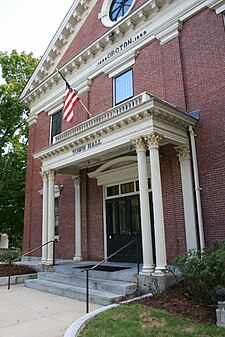West Groton, Massachusetts
| Groton, Massachusetts | ||
|---|---|---|
| Town | ||

Town Hall
|
||
|
||
| Motto: "Faith, Labor" | ||
 Location in Middlesex County in Massachusetts |
||
| Coordinates: 42°36′40″N 71°34′30″W / 42.61111°N 71.57500°WCoordinates: 42°36′40″N 71°34′30″W / 42.61111°N 71.57500°W | ||
| Country | United States | |
| State | Massachusetts | |
| County | Middlesex | |
| Settled | 1655 | |
| Incorporated | 1655 | |
| Government | ||
| • Type | Open town meeting | |
| • Administrative Officer | Jean E. Kitchen | |
| • Board of Selectmen |
George F. Dillon, Jr. Peter S. Cunningham John L. Saball Mihran Keoseian, Jr. 1 Vacancy |
|
| Area | ||
| • Total | 33.7 sq mi (87.3 km2) | |
| • Land | 32.8 sq mi (84.9 km2) | |
| • Water | 0.9 sq mi (2.4 km2) | |
| Elevation | 320 ft (98 m) | |
| Population (2010) | ||
| • Total | 10,646 | |
| • Density | 320/sq mi (120/km2) | |
| Time zone | Eastern (UTC-5) | |
| • Summer (DST) | Eastern (UTC-4) | |
| ZIP code | 01450 | |
| Area code(s) | 351 / 978 | |
| FIPS code | 25-27480 | |
| GNIS feature ID | 0619399 | |
| Website | www |
|
Groton is a town in northwestern Middlesex County, Massachusetts, United States. The population was 10,873 at the 2012 town census. It is home to two prep schools: Groton School, founded in 1884, and Lawrence Academy at Groton, founded in 1792. The historic town was a battlefield in King Philip's War and Queen Anne's War, experienced incidents of insurrection during Shays's Rebellion, and was the birthplace of William Prescott, who commanded the colonial forces at the Battle of Bunker Hill.
The area surrounding modern day Groton has, for thousands of years, been the territory of various cultures of indigenous peoples. They settled along the rivers for fishing and transportation. Historic tribes were Algonquian-speaking Nipmuc and Nashaway Indians.
The Anglo-American Groton started with the trading post of John Tinker, who conducted business there with the Nashaway at the confluence of Nod Brook and the Nashua River. The Nashaway called the area Petapawag, meaning "swampy land." Other pioneers followed the Algonquian trails from Massachusetts Bay, as Tinker had. They found the region productive for fishing and farming.
...
Wikipedia

